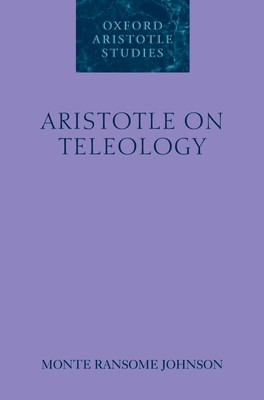
- We will send in 10–14 business days.
- Author: Monte Ransome Johnson
- Publisher: Clarendon Press
- ISBN-10: 0199285306
- ISBN-13: 9780199285303
- Format: 15.9 x 23.8 x 3.2 cm, kieti viršeliai
- Language: English
- SAVE -10% with code: EXTRA
Reviews
Description
Monte Johnson examines the most controversial aspects of Aristiotle's natural philosophy: his teleology. Is teleology about causation or explanation? Does it exclude or obviate mechanism, determinism, or materialism? Is it focused on the good of individual organisms, or is god or man the ultimate end of all processes and entities? Is teleology restricted to living things, or does it apply to the cosmos as a whole? Does it identify objectively existent causes in the world, or is it merely a heuristic for our understanding of other causal processes? Johnson argues that Aristotle's aporetic approach drives a middle course between these traditional oppositions, and avoids the dilemma, frequently urged against teleology, between backwards causation and anthropomorphism. Although these issues have been debated with extraordinary depth by Aristotle scholars, and touched upon by many in the wider philosophical and scientific community as well, there is no comprehensive historical
treatment of the issue.
EXTRA 10 % discount with code: EXTRA
The promotion ends in 23d.12:53:55
The discount code is valid when purchasing from 10 €. Discounts do not stack.
- Author: Monte Ransome Johnson
- Publisher: Clarendon Press
- ISBN-10: 0199285306
- ISBN-13: 9780199285303
- Format: 15.9 x 23.8 x 3.2 cm, kieti viršeliai
- Language: English English
Monte Johnson examines the most controversial aspects of Aristiotle's natural philosophy: his teleology. Is teleology about causation or explanation? Does it exclude or obviate mechanism, determinism, or materialism? Is it focused on the good of individual organisms, or is god or man the ultimate end of all processes and entities? Is teleology restricted to living things, or does it apply to the cosmos as a whole? Does it identify objectively existent causes in the world, or is it merely a heuristic for our understanding of other causal processes? Johnson argues that Aristotle's aporetic approach drives a middle course between these traditional oppositions, and avoids the dilemma, frequently urged against teleology, between backwards causation and anthropomorphism. Although these issues have been debated with extraordinary depth by Aristotle scholars, and touched upon by many in the wider philosophical and scientific community as well, there is no comprehensive historical
treatment of the issue.


Reviews